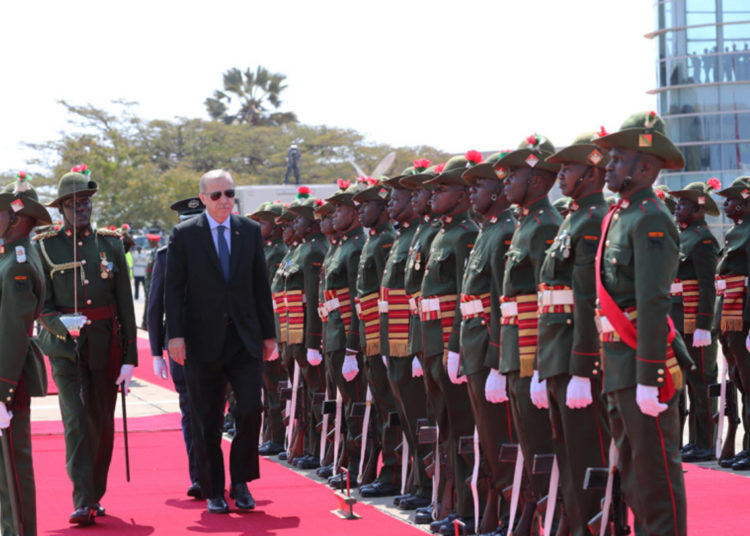Nordic Monitor
The government of Turkish President Recep Tayyip Erdoğan has signed a security cooperation agreement with Zambia to expand its crackdown on government critics and to facilitate political persecution and intelligence operations in Zambia.
Similar to previous security accords, the text of the agreement, obtained by Nordic Monitor, contains ambiguous phrases that could be used by the Turkish government to suppress journalists living in exile and critics outside the country.
“In combatting terrorism, the Parties shall prevent the activities of the visual and written media organs of terrorist organizations and their front institutions operating in their territories against the other Party,” Article 2 (3.a) states, adding that “The Parties shall consider them as illegal organizations, and shall take appropriate measures in this regard according to their national legislations.”
“The parties shall develop and implement efficient combating measures regarding the persons and institutions providing financial or other support including sheltering, accommodation, training and treatment and logistic support to the terrorist organizations in their territories,” Article 2 (3.b) states.

The ambiguity of the phrases has given rise to serious concerns of the possible arrest of Erdoğan critics living in Zambia. In accordance with these articles, the Zambian authorities may prosecute journalists who are defined as terrorists by President Erdoğan’s government and treat their media institutions as terrorist entities.
The same article also connects the activities of legal organizations to terrorism. Such uncertainties in the diplomatic documents may pave the way for President Erdoğan to pressure foreign governments to hand over schools and other institutions affiliated with Erdogan’s arch-foe, Fethullah Gülen, to the Maarif Foundation. Gülen leads a worldwide movement that is active in education, charity, interfaith dialogue and outreach activities. He has been highly critical of the Erdoğan government for Turkey’s aiding and abetting of armed jihadist groups in Syria.
Gülen revealed that he rejected a demand from Erdoğan to tap schools operated by businesspeople aligned with the movement for use in promoting the Turkish president’s political goals, which prompted the Turkish government to establish Maarif in order to compete with and take over Gülen schools.
Furthermore, the agreement regulates the assistance requests of the security authorities from both parties. “Cooperation within the framework of this Agreement shall take place based on the requests for assistance made by the competent authority concerned or upon initiative of the competent authority which deems the assistance is of interest to the other competent authority,” Article 3 (1) notes, with section (6) stating that “The requested Party shall take all the measures necessary to execute the request in the most rapid and complete way as possible.”
It is obvious that Article 3 of the agreement could become a convenient tool to force Zambian authorities to extradite Erdoğan critics living in the country. Moreover, Turkey’s National Intelligence Organization (MIT) may benefit from the ambiguity of the aforementioned articles to conduct operations on Zambian soil targeting dissidents.
The 11-article agreement was submitted to parliament for ratification on September 13, 2019 by President Erdoğan.
The letter submitted to parliament seeking approval of the agreement with Zambia:
According to Article 1, the party states pledge to cooperate in “fighting transnational crimes, in particular crimes related to terrorism, organized crime, goods and migrants smuggling, trafficking in human beings, narcotic drugs and psychotropic substances and their precursors.” Turkey-Zambia security cooperation includes information, intelligence and assessment sharing as well as operational cooperation regarding the terrorist organizations and their methods, acts and financial sources.
The agreement allows both sides to appoint liaison officers to increase the efficiency of interaction and coordination of joint actions. According to the text, the party states will carry out training programs and courses and conduct projects for providing support in areas such as technical assistance, material donation and consultancy, with the aim of building the administrative and institutional capacities of law enforcement institutions.

Nordic Monitor previously reported how security cooperation agreements have emerged as a significant mechanism used by the regime of President Erdoğan since the Gezi anti-government protests of 2013 to harass journalists and critics living abroad. According to Nordic Monitor research, the content of the security agreements has changed in parallel to the transformation of national legislation, and the new documents contain ambiguous copy-paste phrases designed to suppress government opponents outside the country, while the number of agreements has increased since the Gezi uprising.
The text was signed on July 28, 2018 in Lusaka by Turkish Defense Minister Hulusi Akar and Zambian Home Affairs Minister Stephen Kampyongo during President Erdoğan’s visit, the first-ever presidential visit from Turkey to Zambia.
The terms of the agreement will be executed by the Ministry of Interior on the Turkish side and the Ministry of Home Affairs for Zambia. The deal will be in effect for five years and shall be renewed upon the agreement of the parties.
Text of the security agreement is posted below:












